Key takeaways:
- Family check-ins foster emotional honesty, allowing members to express feelings and share struggles, leading to stronger bonds and improved communication.
- Regularly scheduled check-ins, treated as important commitments, enhance family dynamics and create a supportive environment for discussing achievements and challenges.
- Incorporating activities like game nights and cooking enhances family connections, fostering deeper conversations and shared experiences.
- Reflecting on check-in discussions reveals insights into personal behavior and relationship dynamics, promoting emotional growth and appreciation within the family.
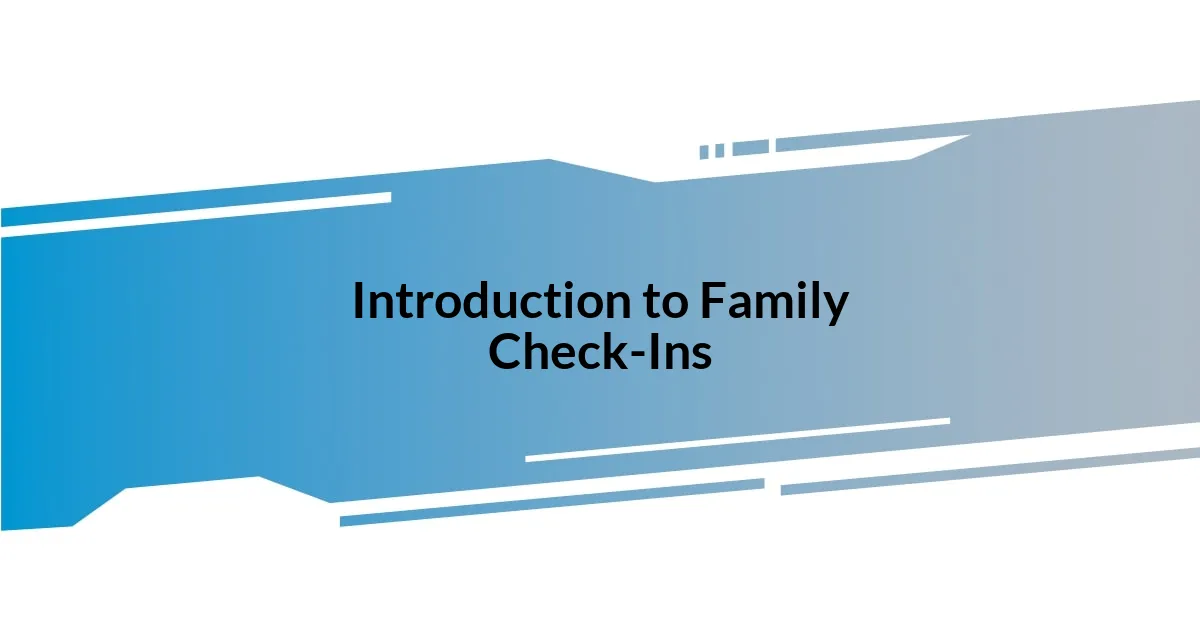
Introduction to Family Check-Ins
Family check-ins are a vital practice that allows us to connect deeply in our busy lives. I remember the first time my family decided to set aside time to sit down together just to share how we were all feeling. It was a simple yet powerful moment that transformed our communication, opening us up to understand each other’s struggles and joys better.
What struck me most during these check-ins was the emotional honesty that came to the surface. I recall one session where my teenage daughter confessed how overwhelmed she felt with school. Hearing her vulnerability shifted my perspective, reminding me how important it is for each family member to have a safe space to express their feelings. Are we really aware of what our loved ones are going through?
These regular gatherings have truly become a lifeline for my family. They help us avoid misunderstandings and promote emotional resilience. Every check-in not only strengthens our bond but also serves as a reminder of the love and support we each have, making it clear that we don’t just live together; we thrive together.
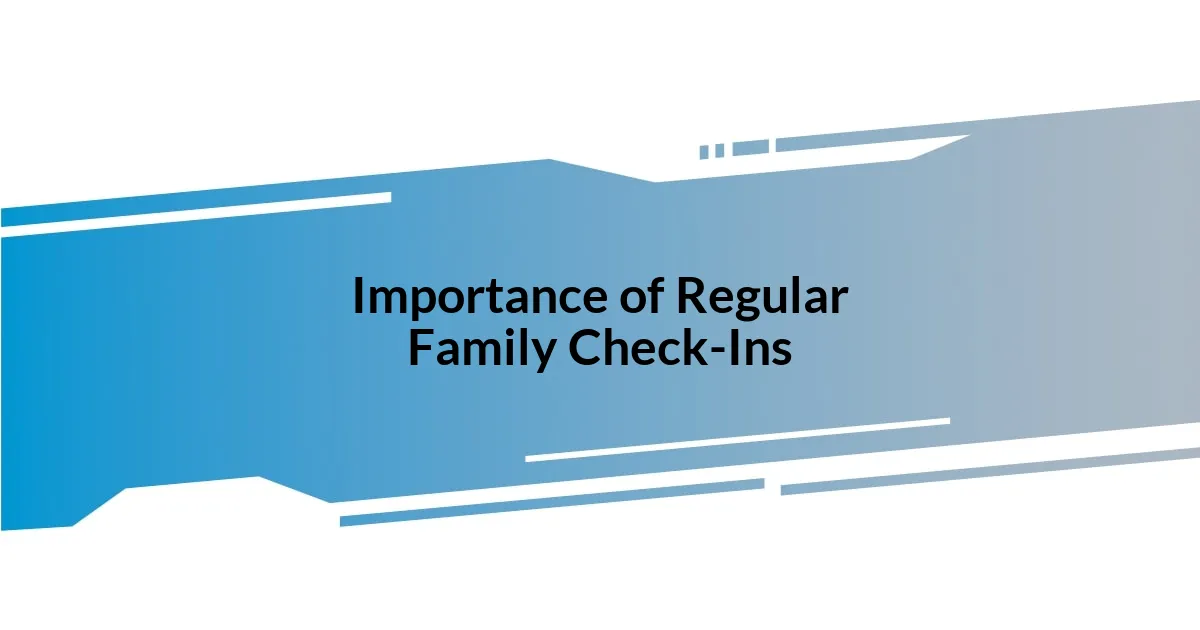
Importance of Regular Family Check-Ins
Regular family check-ins are essential for fostering a supportive environment where each member feels valued and heard. I can vividly recall a time when my younger son opened up about his worries regarding making friends at school. It was during one of our regular check-ins that he gathered the courage to share his feelings, leading us to brainstorm strategies together. That moment not only helped him but also reinforced the idea that we are all in this together. It’s quite incredible how just a few minutes of open dialogue can transform a family dynamic.
The benefits of having these conversations are truly noteworthy:
- Enhanced Communication: Openly sharing feelings helps clarify misunderstandings.
- Emotional Support: Family members learn to lean on each other during tough times.
- Stronger Bonds: Regular check-ins deepen relationships, creating a sense of belonging.
- Conflict Resolution: Discussing issues early prevents them from escalating into bigger problems.
- Empathy Development: Understanding each other’s feelings fosters compassion and kindness.
Each time we gather for these check-ins, I feel a renewed sense of appreciation for my family’s unique perspectives. These moments remind me that while life can be hectic, taking the time to connect is invaluable for nurturing our relationships.
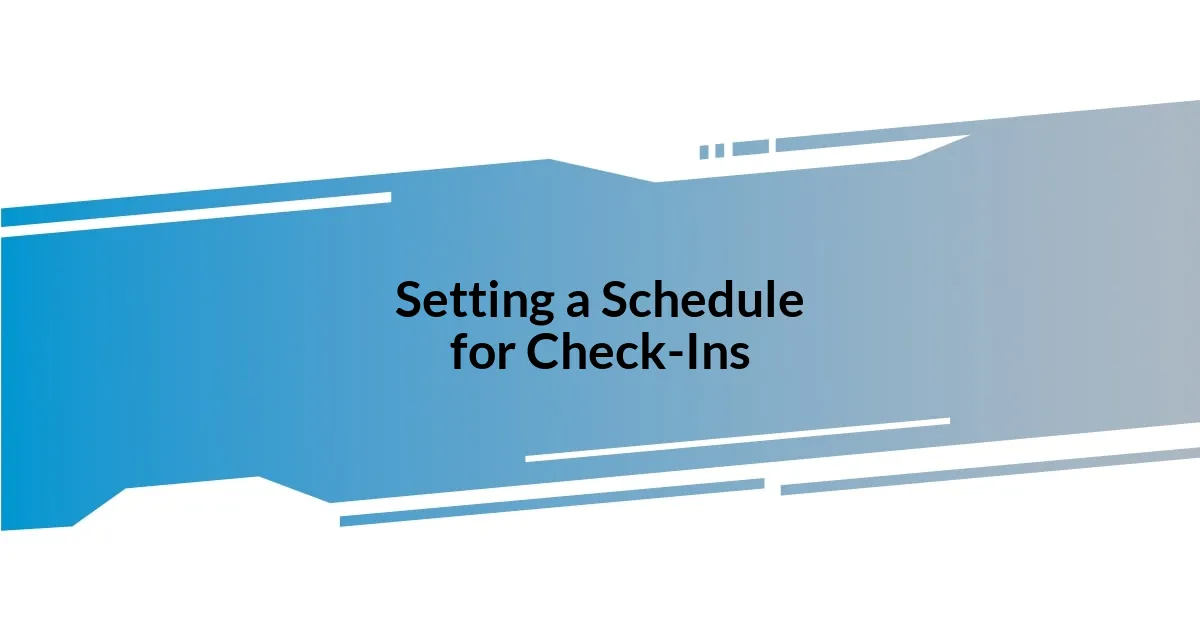
Setting a Schedule for Check-Ins
When deciding how often to hold family check-ins, I’ve found that consistency is crucial. We initially experimented with weekly gatherings, but soon realized that bi-weekly worked better for us, allowing everyone enough time to reflect on their feelings without feeling rushed. It’s essential to find a frequency that fits your family’s rhythm. Have you considered what might work for your family’s schedule?
As we explored different times for our check-ins, I discovered that evenings worked best, with everyone unwinding from the day. I remember a particular session where my partner shared their stress from work. It turned into an enlightening discussion about coping mechanisms, deepening our understanding of each other’s lives. Scheduling our check-ins during low-stress hours has truly made a difference, enabling everyone to be present and focused.
I often encourage families to mark these sessions in calendars, treating them as non-negotiable appointments, just like any other important commitment. This commitment to check-ins sends a message to each family member that their feelings matter. It’s amazing how a small shift in mindset can transform a simple gathering into a powerful dialogue.
| Scheduling Options | Considerations |
|---|---|
| Weekly | May feel rushed, but fosters regular communication |
| Bi-Weekly | Balanced time for reflection without overwhelming |
| Monthly | May lead to missed feelings if too much time passes |

Topics to Discuss During Check-Ins
When it comes to topics to discuss during family check-ins, I’ve noticed that covering everyone’s emotional well-being can be particularly impactful. I once prompted my teenage daughter to share both her highs and lows from the week. To my surprise, she revealed that a small conflict with a friend had left her feeling isolated. Addressing those feelings opened up a supportive discussion that not only validated her experience but also equipped her with coping strategies, reminding us all that it’s okay to feel vulnerable.
An essential topic we regularly touch on is individual achievements and challenges. There was a time when my son hesitated to share his math test results, fearing he might disappoint us. Encouraging him to discuss his progress, whether it’s good or bad, allowed him to see that we celebrated his efforts, not just the outcomes. This dialogue fostered a culture of honesty—an invaluable lesson for us all, as it helps each of us to support one another more effectively.
Another theme that has emerged in our check-ins is family goals and aspirations. I remember when we collectively expressed our dreams for family vacations, which turned into a fun brainstorming session about where we could go. By discussing future plans, we not only bonded over shared interests but also built excitement for what lies ahead, reinforcing a sense of unity. What are your family’s dreams, and how can you incorporate that conversation into your next check-in? Exploring those aspirations can be a powerful reminder that we’re all on this journey together, supporting one another along the way.
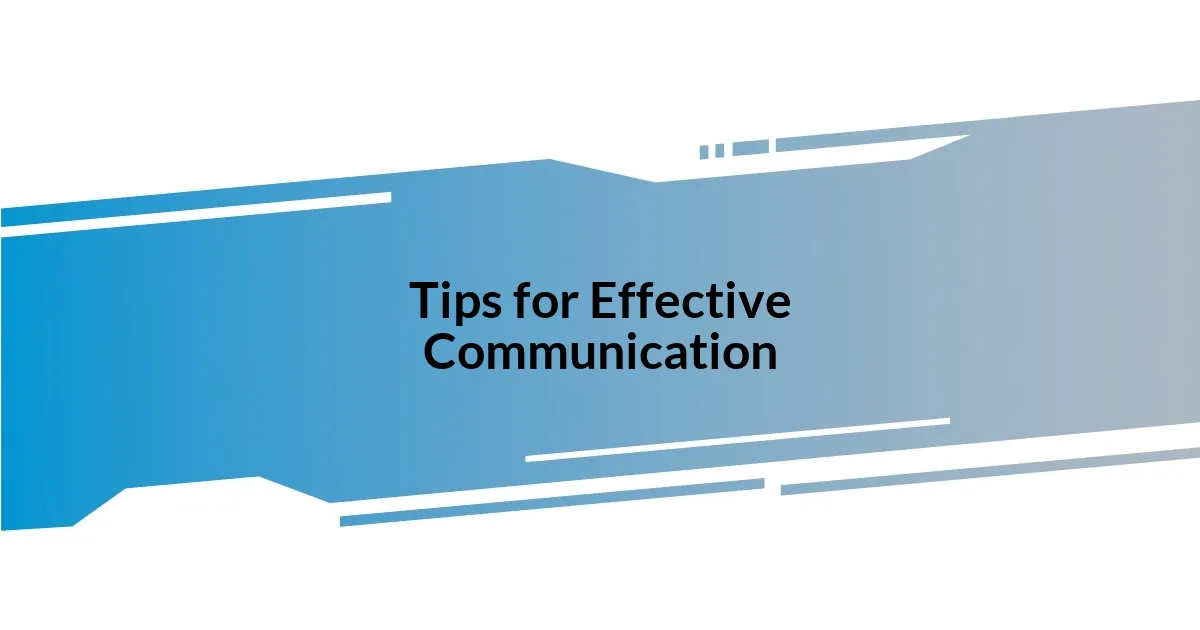
Tips for Effective Communication
Maintaining open lines of communication is vital for family check-ins. I’ve learned that actively listening to each other creates a safe space for sharing. For instance, during one of our sessions, I consciously practiced not interrupting when my partner spoke about their day. It felt refreshing to just hear them out, and it made our conversation richer. Have you ever tried letting someone fully express their thoughts before responding?
Nonverbal cues can also speak volumes during discussions. I remember a time when my son was unusually quiet. Instead of pushing him to talk, I gently nudged him by sharing my own experiences of feeling overwhelmed. That simple act of vulnerability encouraged him to open up, revealing that he was stressed about school projects. It really emphasized how powerful nonverbal communication can be in showing support and understanding.
It’s beneficial to use “I” statements when discussing feelings. Instead of saying, “You never help with the chores,” try expressing how it affects you, like, “I feel overwhelmed when chores pile up.” This shift not only diffuses tension but also invites more constructive dialogue. After I made this change, I noticed our conversations became less confrontational and more about mutual support. Have you thought about how you phrase your feelings during check-ins? It could transform the way your family interacts.

Activities to Enhance Family Bonds
Family bonding activities can truly strengthen relationships in beautiful ways. One memorable experience for us was a family game night. We turned off our devices, set up some board games, and let the laughter and friendly competition flow. Those evenings not only filled our home with joy but also gave us a chance to appreciate each other’s unique personalities and strengths. Have you ever noticed how games can spark deeper conversations?
We also discovered the joy in cooking together. One Sunday, we chose a new recipe and divided the tasks among us. While chopping veggies and stirring the pot, we shared stories about our favorite family meals and how they connected to our childhood. As the aroma filled the kitchen, it became more than just a meal; it was a delicious way to reminisce and strengthen our bond. What’s your family’s go-to recipe that brings everyone together?
Exploring the great outdoors has had a special impact on our family connection as well. One weekend, we decided to go hiking at a nearby nature reserve. The fresh air, shared challenges on the trail, and moments of awe at the scenery drew us closer, prompting us to talk more freely. Each step felt like a collective journey, reinforcing that we’re on this path together. Have you ever taken the time to disconnect from technology and just connect with nature? It can work wonders for family dynamics.
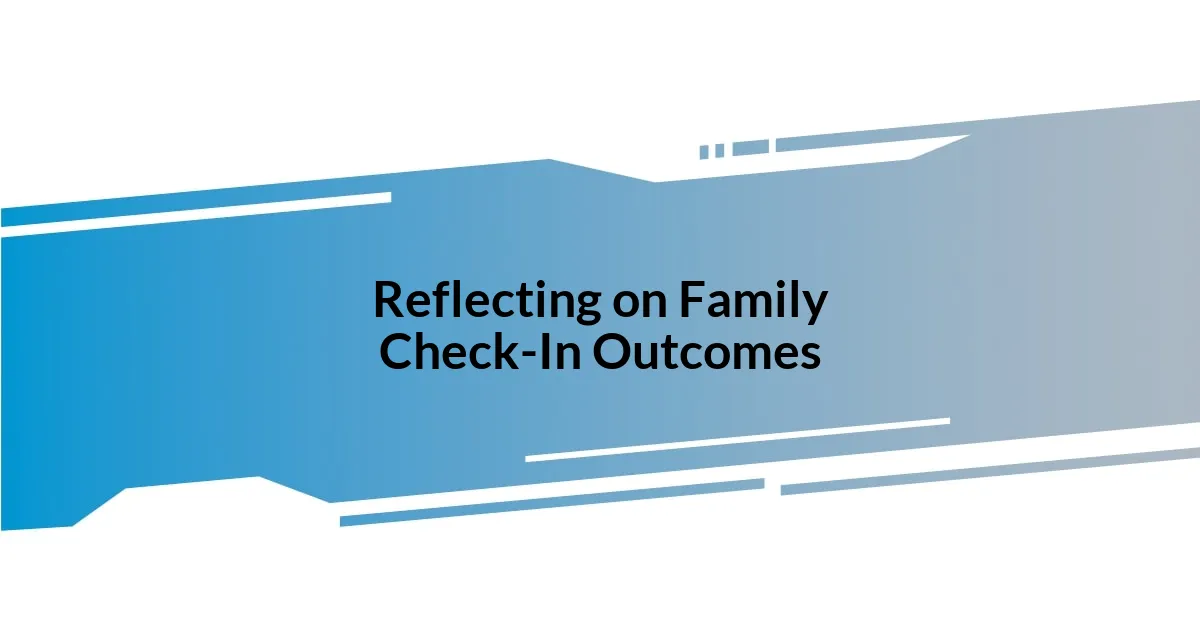
Reflecting on Family Check-In Outcomes
Reflecting on the outcomes of our family check-ins often reveals surprising insights. I remember one session when we decided to discuss our individual stressors. As I talked about my work challenges, I suddenly realized how much I was unintentionally withdrawing from family interactions. Do you ever notice patterns in your behavior only when you share and reflect? That moment helped me understand the importance of being present with my family, even when life gets hectic.
There’s something profoundly fulfilling about recognizing how each check-in session evolves our understanding of one another. After a particularly emotional discussion, I found myself thinking about my daughter’s perspectives on friendship. Her input made me reconsider my own views, showing me that these sessions aren’t just about sharing; they transform how we perceive each other’s experiences. Have you ever walked away from a conversation feeling like you’ve gained a new lens on family dynamics?
The emotional growth that emerges from regular check-ins is remarkable. Just last month, after sharing our victories and setbacks over dinner, my partner expressed gratitude for the space we’ve created. Hearing those words grounded me; I realized that these check-ins have fostered an environment of appreciation and support. How have your family discussions impacted your relationships? Reflecting on these outcomes can deepen our connections in ways we never anticipated.